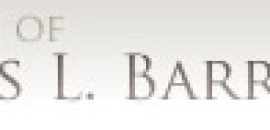At the law office of Douglas L. Barrett, we believe in diligently representing our clients while observing the highest ethical and moral standards. We aggressively represent clients in the areas of personal and business bankruptcy, as well as providing assistance with small business creation. Since our inception, we have prided ourselves on providing quality representation that is client-centered and results oriented.
Call for a free consultation
We understand that being insolvent can be stressful and intimidating, which is why we offer free phone consultations for new clients. During this consultation, we will talk with you about the debts that you owe, so that we can determine whether or not bankruptcy is a viable option.
Getting Started
Bankruptcy isn’t a one-size-fits-all process. Each type of bankruptcy is suited for a different situation, which is why it is so important to work with a professional bankruptcy attorney in Orem, Utah. Our team of legal professionals will work hard with your creditors and with the courts to discharge your debt and get you on the road to a full financial recovery.
When it comes to filing for bankruptcy, one incredibly important distinction is whether your debt is secured or unsecured. Secured debt is money owed where there is some form of collateral, such as a home or a car. For example, your home is the collateral for your mortgage, and if you default, your home will be repossessed. Unsecured debt, on the other hand, is money owed where there is no physical object for collateral, such as credit cards or medical debt. As you read through these different bankruptcy descriptions, think about your creditors and which categories they fall into.
Chapter 7 Bankruptcy
Chapter 7 bankruptcy, also referred to as “straight bankruptcy,” will wipe out common unsecured debts such as personal loans, credit cards, medical bills, and dental bills. Before the process is started, you will be asked to provide a list of all of your known creditors, along with the balance that you owe. It should be noted that Chapter 7 bankruptcy will not discharge secured debt, such as past-due mortgage payments or car loans. Chapter 7 bankruptcy will also not discharge student loan debt, alimony payments, child support, or taxes. Unfortunately, some individuals are disqualified from filing a Chapter 7 bankruptcy because of these issues:
Failing the “Means Test”: If your income is too high, you will not be eligible to file for Chapter 7 bankruptcy. Your monthly income will be carefully evaluated, including any residual income from child support payments, alimony, annuities, or rent collected from rental properties. If your income is more than the state’s median income, you may not be eligible for a Chapter 7 bankruptcy filing.
Previous Bankruptcy Filings: People who have filed for Chapter 7 bankruptcy within the past eight years are ineligible for filing, as are individuals who have filed a Chapter 13 bankruptcy in the previous six years.
Ability to Repay Debt: If your income exceeds the median state income, your ability to repay your debt will be evaluated. If the court decides that you could reasonably repay your debts, your case will be discharged.
Failure to Complete Credit Counseling: Credit counseling is a common requirement for filing bankruptcy. If you fail to complete credit counseling, you will not be eligible for a Chapter 7 bankruptcy filing.
Chapter 12 Bankruptcy
A Chapter 12 bankruptcy is essentially a debt reorganization plan designed to help people categorized as “family fishermen” or “family farmers.” Much like Chapter 13 bankruptcies, Chapter 12 bankruptcies require filers to establish a court-approved repayment plan that is typically spread over a 3 to 5 year timeframe. However, unlike Chapter 13 bankruptcies, Chapter 12 bankruptcies have a higher debt ceiling, since individuals who work in the farming or fishing industries can incur much more debt in a short amount of time than the typical wage earner.
To be eligible for a
Chapter 12 bankruptcy, the total of your secured and unsecured debts cannot surpass $3,237,000, 80% of your debts have to relate to your farm or fishing business, and over 50% of your gross income from the previous year needs to have been generated by your business.
Chapter 13 Bankruptcy
Chapter 13 bankruptcy, also referred to as a “court ordered debt consolidation,” involves grouping all of your debts together, allowing you to make a single monthly payment. The repayment plan is completely based around your living expenses, monthly income and debt total, and typically spans 3 to 5 years. Unlike Chapter 7 bankruptcy filings, Chapter 13 fillings do work for student loan debts and tax debts. However, to be eligible for a Chapter 13 filing, you have to have a regular income and your debts can’t exceed a certain amount. Also, it should be noted that Chapter 13 bankruptcies stay on your credit report for 10 years.
Medical Bankruptcy
Unpaid medical bills are the number one cause of bankruptcy filings, with around 40% of Americans owing money to hospitals and clinics for times when they were sick. Although medical expenses aren’t tied to any form of collateral, insurance companies can still garnish your wages or claim a part of the equity you have in your home. At the law offices of Douglas L. Barrett, we handle medical bankruptcy cases with the utmost care and consideration—you have already been through enough.
Small Business Bankruptcy
We also handle bankruptcies tied to small businesses. Each and every business is different, which is why it is important to sit down with a legal counselor to discuss your options. We have worked with hundreds of business owners to help them discharge debts, reorganize their past-due balances, and protect the future of their companies.
We believe that your legal needs are of the utmost importance and you deserve the care and diligence necessary to successfully accomplish your goals. Contact us today, and speak with an experienced bankruptcy lawyer in Provo, Utah. Feel free to read through our most current client reviews

